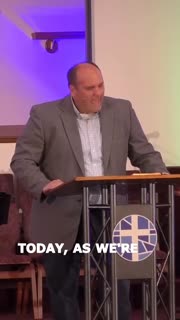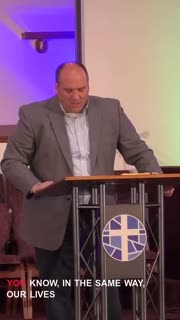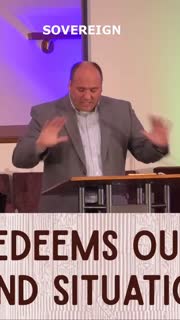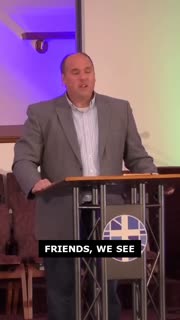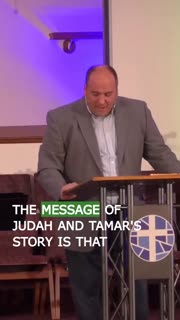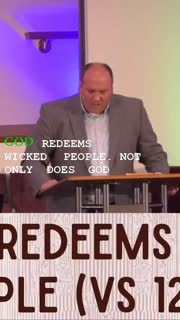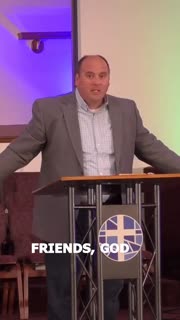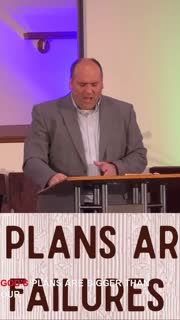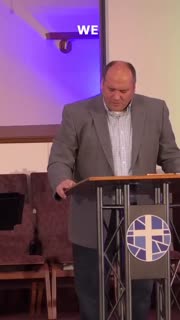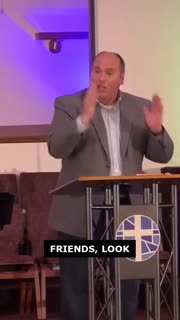God's Redemption Through Judah and Tamar's Story
Devotional
Sermon Summary
Bible Study Guide
Sermon Clips
1) "Today, as we're continuing the story of Joseph, one of the main threads or stories or important words that we see here in the text and through Joseph's life is this, is that God is sovereign over all things. Over the last week, we've been reminded over and over again that God is sovereign over the good and the bad. He is working all things for his glory and our good. And today we're going to look at how God is sovereign even over our faithlessness, when we are not faithful, God still uses that for his plan." [46:27] (46 seconds)
2) "You know, in the same way, our lives might not be as impressive on the outside, but that doesn't mean that God doesn't have a great use for our story and our lives. That he has for us. Even though our lives might be battered by past failures, the waves of mistakes, the lack of perfection, in many ways, sometimes our lives, people might look and say, well, God certainly couldn't use this person. Yet by God's grace and his goodness, he uses the unimpressive or broken people to use and achieve his purposes for us. God can use us and he can change us. He can God support and move forward his plans, even despite our failures and faithfulness." [49:48] (57 seconds)
3) "God is sovereign and friends. He cannot be stopped, even in our own sin and failures. The story of Judah and Tamar is a story of moral failure, deception, and broken relationships. We can't count the many of horrible and bad choices and things that were done sinfully here. In just this one chapter, I believe probably some of us squirmed a little bit as we were reading through it, rightfully so this is what we read through the text that we see, that the Bible and Moses the writer, was not trying to shade Judah in any way. He is not trying to cover things up. He is laying it all out for us to see. And it is good for this, because God is showing us that even sinfulness cannot thwart God himself." [53:03] (64 seconds)
4) "Friends, we see that. Let me give you some hope that we. And one of the main points here is that God uses us despite our own wickedness. But let's not be not forget that God is a holy God and he must go against sin and unholiness. And right here, ur was so wicked that Lord just struck him dead. We don't know what he did. But, I mean, reading this chapter, we'd say, man, er must have been a pretty bad guy, reading the rest of things that happened here. Well, because of Er's death, Tamar was a widow. And because of the way that things should be done in that time period that the wife needed to be cared for." [55:32] (43 seconds)
5) "The message of Judah and Tamar's story is that even God is sovereign over the worst actions. With him at the helm of all of time and all of the world, God is using even the damaged, even the unlovely, even the wicked for his plan. Know that God is still working in the mess. God specializes in taking what seems like the hopeless and turning it into something beautiful. He can redeem your brokenness and put your life back in his hands, knowing that he makes all things new. God is sovereign and is in control of our lives. Even when we're unfaithful and disobedient, he is sovereign and he will use us in his plans." [01:04:56] (55 seconds)
6) "God redeems wicked people. Not only does God redeem sinful actions and use those actions in his plans, he also redeems the very people who commit them. Judah, who had been living a deceptive, self centered and blind to his own wrongdoing, is being used by God. And I can't wait for us to get. Hopefully you've read forward. You will see that Judah plays a major important part to his family and the rest of the story of the Bible. But we see that Judah is important and God uses and redeems him. Friends, isn't this just like what we would think? We would normally, if we're reading any book that we pick up and we would read what Judah's done, we would have just cast him off." [01:06:15] (51 seconds)
7) "Friends, God redeems broken people, and he can redeem you. Maybe you see yourself as someone beyond redemption, someone in your past or something in your past makes you unlovable. But, friends, God's grace is available to Judah, to Tamar, to John Newton, and to you. And how did they receive this? Well, friends, we receive this through relationship, through Jesus Christ. I don't know why you're here today, but by God's grace, we know that he is sovereign. And maybe you came by invitation of a friend. Maybe you're traveling through, maybe you are tuning in just to see what's happening on Facebook and you see this video feed, whatever that is, you need to hear this. That God redeems evil, broken, sinful people. And he does so by faith, through his son, Jesus Christ." [01:13:08] (74 seconds)
8) "God's plans are bigger than our failures. Our wickedness and sins can't stop him. We ourselves can be used by him and be redeemed, but God's plan is bigger than every part of our story. We may be wicked people with wicked actions, but God continues his plans by grace and by his sovereign wisdom. When I was talking with my life group this week, I started to, I was thinking through, and I'm so thankful for my I love my life group. I wish I actually met with them first so I could preach better. But I learned a lot of good things. But as I'm thinking through it, one of the things that we were talking through is seeing these connections of people that we worked through. And one of the benefits of walking through Genesis. We've seen these big stories come through." [01:15:15] (54 seconds)
9) "Friends, we see God's providence ruling and overruling the purposes and judgment of grace. What do we see here? Well, even through this instance, Judah fathers really interestingly, in some ways, what could be considered his grandchildren, but it's really his children. But here he sees and fathers Perez. Now, what's so important about this? Well, if we see this, it is the lineage of the covenant that continues. And in this, we see that the promise given to Abraham, that the nations will be brought together. How does this happen? Only through the work of Jesus Christ. But this family continues through the birth of Perez and through Judah." [01:17:57] (50 seconds)
10) "Friends, look at the story of Judah. Look at the story of Tamar. God still calls us to be part of his work. And just as Jesus came through the broken lineage of Judah and Tamar, he worked through our brokenness to accomplish his plans. So, friends, if you have guilt or shame holding you back, remember, the grace of God is bigger. Therefore, now is no condemnation. In Christ Jesus, our Lord, you are forgiven. You can be used. And God's grace is bigger. Friends, God is sovereign, in control of our lives. And even when we're unfaithful and disobedient, he will use us as part of his plans. Let's praise God for that today." [01:21:57] (54 seconds)
Ask a question about this sermon
2) "You know, in the same way, our lives might not be as impressive on the outside, but that doesn't mean that God doesn't have a great use for our story and our lives. That he has for us. Even though our lives might be battered by past failures, the waves of mistakes, the lack of perfection, in many ways, sometimes our lives, people might look and say, well, God certainly couldn't use this person. Yet by God's grace and his goodness, he uses the unimpressive or broken people to use and achieve his purposes for us. God can use us and he can change us. He can God support and move forward his plans, even despite our failures and faithfulness." [49:48] (57 seconds)
3) "God is sovereign and friends. He cannot be stopped, even in our own sin and failures. The story of Judah and Tamar is a story of moral failure, deception, and broken relationships. We can't count the many of horrible and bad choices and things that were done sinfully here. In just this one chapter, I believe probably some of us squirmed a little bit as we were reading through it, rightfully so this is what we read through the text that we see, that the Bible and Moses the writer, was not trying to shade Judah in any way. He is not trying to cover things up. He is laying it all out for us to see. And it is good for this, because God is showing us that even sinfulness cannot thwart God himself." [53:03] (64 seconds)
4) "Friends, we see that. Let me give you some hope that we. And one of the main points here is that God uses us despite our own wickedness. But let's not be not forget that God is a holy God and he must go against sin and unholiness. And right here, ur was so wicked that Lord just struck him dead. We don't know what he did. But, I mean, reading this chapter, we'd say, man, er must have been a pretty bad guy, reading the rest of things that happened here. Well, because of Er's death, Tamar was a widow. And because of the way that things should be done in that time period that the wife needed to be cared for." [55:32] (43 seconds)
5) "The message of Judah and Tamar's story is that even God is sovereign over the worst actions. With him at the helm of all of time and all of the world, God is using even the damaged, even the unlovely, even the wicked for his plan. Know that God is still working in the mess. God specializes in taking what seems like the hopeless and turning it into something beautiful. He can redeem your brokenness and put your life back in his hands, knowing that he makes all things new. God is sovereign and is in control of our lives. Even when we're unfaithful and disobedient, he is sovereign and he will use us in his plans." [01:04:56] (55 seconds)
6) "God redeems wicked people. Not only does God redeem sinful actions and use those actions in his plans, he also redeems the very people who commit them. Judah, who had been living a deceptive, self centered and blind to his own wrongdoing, is being used by God. And I can't wait for us to get. Hopefully you've read forward. You will see that Judah plays a major important part to his family and the rest of the story of the Bible. But we see that Judah is important and God uses and redeems him. Friends, isn't this just like what we would think? We would normally, if we're reading any book that we pick up and we would read what Judah's done, we would have just cast him off." [01:06:15] (51 seconds)
7) "Friends, God redeems broken people, and he can redeem you. Maybe you see yourself as someone beyond redemption, someone in your past or something in your past makes you unlovable. But, friends, God's grace is available to Judah, to Tamar, to John Newton, and to you. And how did they receive this? Well, friends, we receive this through relationship, through Jesus Christ. I don't know why you're here today, but by God's grace, we know that he is sovereign. And maybe you came by invitation of a friend. Maybe you're traveling through, maybe you are tuning in just to see what's happening on Facebook and you see this video feed, whatever that is, you need to hear this. That God redeems evil, broken, sinful people. And he does so by faith, through his son, Jesus Christ." [01:13:08] (74 seconds)
8) "God's plans are bigger than our failures. Our wickedness and sins can't stop him. We ourselves can be used by him and be redeemed, but God's plan is bigger than every part of our story. We may be wicked people with wicked actions, but God continues his plans by grace and by his sovereign wisdom. When I was talking with my life group this week, I started to, I was thinking through, and I'm so thankful for my I love my life group. I wish I actually met with them first so I could preach better. But I learned a lot of good things. But as I'm thinking through it, one of the things that we were talking through is seeing these connections of people that we worked through. And one of the benefits of walking through Genesis. We've seen these big stories come through." [01:15:15] (54 seconds)
9) "Friends, we see God's providence ruling and overruling the purposes and judgment of grace. What do we see here? Well, even through this instance, Judah fathers really interestingly, in some ways, what could be considered his grandchildren, but it's really his children. But here he sees and fathers Perez. Now, what's so important about this? Well, if we see this, it is the lineage of the covenant that continues. And in this, we see that the promise given to Abraham, that the nations will be brought together. How does this happen? Only through the work of Jesus Christ. But this family continues through the birth of Perez and through Judah." [01:17:57] (50 seconds)
10) "Friends, look at the story of Judah. Look at the story of Tamar. God still calls us to be part of his work. And just as Jesus came through the broken lineage of Judah and Tamar, he worked through our brokenness to accomplish his plans. So, friends, if you have guilt or shame holding you back, remember, the grace of God is bigger. Therefore, now is no condemnation. In Christ Jesus, our Lord, you are forgiven. You can be used. And God's grace is bigger. Friends, God is sovereign, in control of our lives. And even when we're unfaithful and disobedient, he will use us as part of his plans. Let's praise God for that today." [01:21:57] (54 seconds)
